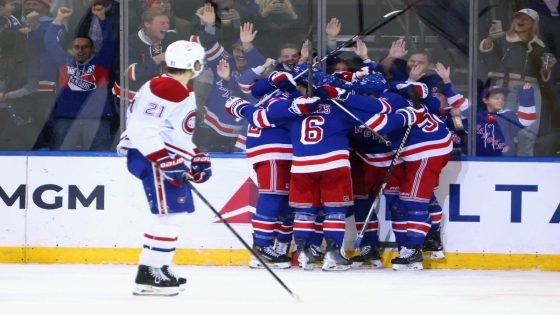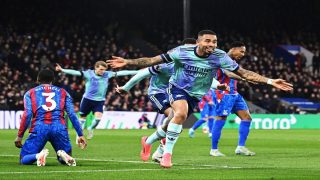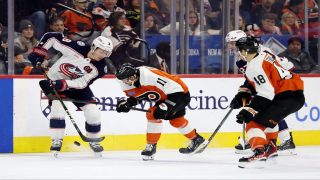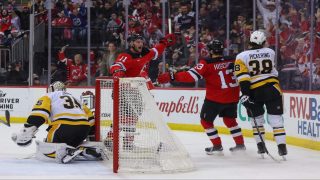NEW YORK — One of Martin St. Louis’ favourite lines is that if you do the right actions on the ice over and over, it won’t guarantee you win the game, but it will put the odds in your favour.
But even favourable odds sometimes fall prey to random circumstances. In poker, that’s called a bad beat, and the worst thing you can do in poker is to allow a bad beat to change your overall strategy, the one that put you in position to win that hand but ultimately fell through because of random circumstances.
The Montreal Canadiens clearly felt the random circumstances against the New York Rangers on Saturday afternoon were the work of veteran officials Francis Charron and Kelly Sutherland, who, it must be said, had a terrible afternoon.
At the end of the game, Canadiens executive vice president of hockey operations — and former Rangers general manager — Jeff Gorton came walking toward an elevator full of reporters, Canadiens hockey operations staff, and a couple of the Rangers’ assistant coaches. He was so angry, that he did not take who was in the elevator into account. He probably didn’t even see them.
He walked straight up to the wall next to the elevator and punched it. Hard. He then made a comment on those random circumstances that we won’t specify.
Several minutes later, after commiserating with his coaching staff and management, St. Louis came out to answer questions from the media and didn’t answer a single one. Instead, he repeated the same line over and over again, no matter what the question was.
“I loved everything about our game,” he responded, in both official languages. “I’m not going to talk about the refs.”
His mentor John Tortorella would have been beaming with pride.
But the referees were not the only random circumstances to impact this game. And this one might have even been more important.
It was the quality of the ice, which is never good at Madison Square Garden, but was particularly bad in this game, coming off a Creed concert less than 12 hours earlier.
“Yes,” confirmed Mike Matheson. “Awful.”
Two shifts before Kirby Dach took a double-minor for high-sticking Mika Zibanejad below the Rangers goal line — far more of a missed stick lift than an egregious error — the Rangers seemed like they wanted the Canadiens to win the game. Nick Suzuki was allowed to walk in from the blue line for a quality opportunity on Jonathan Quick, Rangers defencemen K’Andre Miller and Braden Schneider parting like the Red Sea, and Suzuki whiffed. Cole Caufield got an opportunity moments later with Quick out of position and an open net in front of him, and he whiffed as well.
I had never seen the term “flub” used on the NHL’s official play-by-play sheet before, but it was used on both those shots.
“I’ve got to look back at it, but I thought I had pretty good possession when I went to go shoot it, and then just whiffed on it. It stuck with me for a little bit, tried to get it into the slot and Cole just missed it. Had some other chances there too. Would have been a big point.”
On the six-on-five, after Kappo Kakko converted on the Rangers’ third power-play goal of the game, a goal that came after Joel Armia was clearly tripped along the boards — the play that led to St. Louis doing his best Marshawn Lynch impression postgame as he tried his best not to get fined — the puck never settled down for the Canadiens.
The thing is, the way the Canadiens have often played this season, having bad ice would have been to their advantage, because it was often the opposing team that had the puck more. Not so this time.
Miller and Schneider were consistently matched against Suzuki, Caufield and Alex Newhook, an intentional decision from Rangers coach Peter Laviolette, and the Canadiens had 24 shot attempts in the 11:16 five-on-five minutes where Suzuki and Miller were on the ice together, according to Natural Stat Trick.
The Rangers had five.
Expected goals in those minutes were at 92.74 percent in favour of the Canadiens.
“Our line was good tonight,” Newhook said. “We were all over the puck, played a lot in the offensive zone, didn’t play a lot in the D-zone, which is always a good sign. Unlucky to not get a few more.”
Overall, the Canadiens controlled 65.13 percent of the expected goals and had 15 high-danger scoring chances at five-on-five, compared to six for the Rangers. The eye test matched those numbers.
This was, quite simply, one of the best games the Canadiens have played this season.
Which is why the shoddy work of a veteran officiating crew made it so difficult to swallow.
But the Canadiens need to make sure they won’t let a bad beat derail their strategy, the one that put them in a position to suffer a bad beat to begin with.
The outburst from Gorton, the raw emotion in a very public setting, shows the extent to which the Canadiens have entered a different phase of their rebuild.
Gorton just passed his three-year anniversary with the Canadiens, and watching a team he is largely responsible for rebuilding beat the team he is currently rebuilding thanks to random circumstances had to be frustrating. As the wall next to the press box elevator at Madison Square Garden learned the hard way.
It was Gorton who said prior to the season that he wouldn’t put it past the Canadiens to make the playoffs, but that it would be important for his group to at least play meaningful games past the trade deadline and into March and April.
And the reason he was so upset after the game, at least presumably, is that this team he is rebuilding showed tangible signs that it is coming out of a long, season-opening funk where it looked lost, where it was defensively leaky and was performing like the worst team in the league, and still lost the game because of random circumstances.
But the reality is that his Canadiens finished the month of November with a five-on-five expected goal share of 52.35 percent, after finishing the month of October at 40.33 percent, second-worst in the league. They finished October allowing 4.24 goals against per 60 minutes of ice time at five-on-five, by far the worst rate in the league, and they finished November at 2.73.
And perhaps two of Gorton’s most important acquisitions since he took over, Dach and Juraj Slafkovský, are also showing signs of life, signs the rebuild can count on them to carry their admittedly heavy weight.
Dach’s penalty on Zibanejad came as a result of him battling in the offensive zone. St. Louis said Friday after practice that Dach “is starting to see things a little clearer” and that the results should soon follow. They didn’t come for him Saturday, but the signs he is coming around were definitely there. The massive scrum that broke out toward the end of the second period started because Dach pushed Zibanejad into Quick after the whistle, something that led Quick to go after Dach in his crease.
That is the edge the Canadiens need from Dach, something that was sorely lacking over his first 15 or so games, but is slowly creeping back into his game.
And while Slafkovský wasn’t quite as impactful as he was Wednesday night in Columbus, his strong play down low, combined with that of Brendan Gallagher, led directly to Matheson’s goal that tied the game in the first period and gave Slafkovský as many points in his last two games as he had in his previous nine.
Mike Matheson responds quickly for Montreal, tying the score up at 1!#GoHabsGo pic.twitter.com/iHhc8tWwWK
— Hockey Daily 365 l NHL Highlights & News (@HockeyDaily365) November 30, 2024
Things are coming around for the Canadiens, in a relative sense. They finished November with a record of 4-6-2, which is not great. But the process in those 12 games, and in particular their last seven games, has been much better.
It will be important for the Canadiens to remember that, to remember they are improving their odds through an increasing amount of good actions on the ice, and not let a bad beat in New York derail it all.
(Photo of Kaiden Guhle watching the Rangers celebrate the winning goal: Bruce Bennett / Getty Images)





